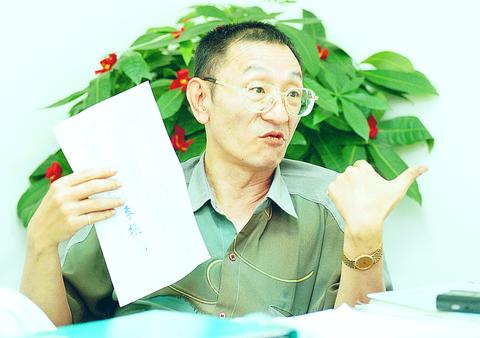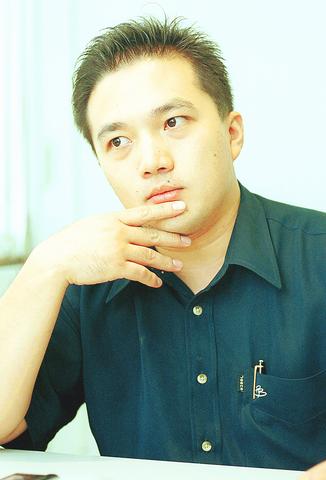Finding a way to make people in debt pay up has always posed a problem. But one man has found that thinking unconventionally often reaps the most rewards.
First he hired former jail inmates to collect debts, then people who were HIV-positive. And if everything goes to plan, the next group of collection agents will be prostitutes.
The aim of this new agency is clear: Debts must be paid.

PHOTO: CHIANG YING-YING, TAIPEI TIMES
Tung Nien-tai (
Even though the methods that the company uses to get people to pay are often criticized as being unorthodox, the company has raised its national profile and amazingly, is making big money.
"I never think of losing money. It's a large market and I'm quite confident of what I can achieve. I'm Tung Nien-tai. I'm everyone's nightmare," the 50-year-old said, flashing a smile stained with betel nut juice.

PHOTO: CHIANG YING-YING, TAIPEI TIMES
A man with a long history
Tung, who had been in and out of jail several times before 1987, has spent most of his life criticizing police and public officials who he believes often abuse their power to violate the rights of ordinary citizens. "My prison experiences tell me that," he said.
Tung formed the Resurrection Services Center in 1987 and made a name for himself by challenging what he called the "top 10 bad cops in the country." Later, to press for the legalization of casinos, he held a national mahjong (
His other "achievements" include provoking a prison riot, holding a seminar attended by the nation's leading gangsters and finally forming the Taiwan Communist Party.
He has been a street vendor, a real estate broker, a restaurant owner, and a florist. Now he dedicates his time and energy to the collection agency. Making money is a priority, but he has another concern -- to make the privileged look bad.
"We're doing everything to embarrass the debtors and smash their shield of privilege. I just can't tolerate people abusing their positions or their power to take advantage of the weak," Tung said. "And believe me, I'm able to think of thousands of ways to make these people look bad. I know what the debtors are afraid of."
A method to the madness
When a client turns to ResuCredit for help, he or she is first requested to provide a complete collection of documents and court papers in relation to the debt to be collected.
Following the verification process, Tung then starts discussing details of the case and tells his clients there is at most a 50 percent chance they will get their money back.
"I never boast to my clients that I can absolutely get their money back. I make it clear at the beginning that it's a 50-50 situation. But if I can't get back the money for them, I don't think anyone can," Tung said.
With the information at hand, Tung begins studying possible methods to collect the debt. Tung uses different methods according to the kind of person that owes money.
A debt-collection team of ex-cons, for example, is often used to collect debts from individuals. They stand in front of a debtor's house carrying banners or posters that, in effect, air the debtor's dirty laundry.
If this doesn't get the desired response, the team then begins to stalk the debtor. Most of the time this method works -- the debtor gets so embarrassed by the fierce-looking gang tailing him that he finally surrenders.
In dealing with corporate debtors, Tung deploys a team of HIV-positive patients who confront the debtor with signs that say "I'm HIV-positive."
Sometimes those infected with HIV will even hug the debtor, but that is as far as the intimidation goes.
The debt collectors are hired on a case-by-case basis and each of them is paid NT$3,000 per day. Controversial as the methods might be, they do not violate the law.
"Our latest case is to try to collect from a guy whose father is a local commissioner and whose mother is a lawmaker. This time, I'm going to use prostitutes to carry out the job," Tung said.
On dangerous ground
With business booming, Tung has become a thorn in the side of traditional collection agencies who often resort to violence, or the threat of it, to make debtors pay.
"I've just received three calls from them today, threatening horrible consequences if I still have my own way. While I'm talking to you now, I'm at the same time thinking of how to fight these battles," Tung said during his interview with the Taipei Times.
Because he runs his business in such a controversial way, Tung says that he is well aware that he will have to accept the fact that not everyone will appreciate his techniques.
One debtor, who has been tailed by Tung's debt-collection team, recently went to the police and filed a complaint of defamation against him. It is the first such action, but Tung seems to sense that it will not be the last.
"I don't care. Let's see who will be most embarrassed in the end," he said.
The cavalier way Tung does business may sound daring, but in fact his every move has been carefully thought out. His business partner, Ivan Liu (
Liu, having observed the debt-collection business in Taiwan and Western countries, encouraged Tung to start his own company after Tung began to take the idea seriously.
Substantiation
"Based on my experience as a lawyer, I can tell you over 1,000 ways for a debtor here to release his property and dodge his legal liabilities. That's why I think Taiwan badly needs a debt-collection agency like us," Liu said.
Liu said that in the "old days," the stereotype was that of poor debtors and rich creditors. He noted, however, that today it is exactly the other way around.
"Six or seven of our clients are those who have been swindled into investing their life savings in some sort of bogus operation. Unfortunately, the people running these scams often have such good connections with public officials or the police that they can easily avoid prosecution," Liu said.
"I know there are people who don't agree with our methods. But let's be fair and get it straight: Who is the source of all this agony? We wouldn't have to take the pains to plan these things in such detail if the debtors would just repay the money they owe," he said.
Though being supportive of Tung's peculiar ideas, Liu still has to make sure the actions of the company do not result in legal prosecution. Before the debt-collection teams go out on their missions, Liu gives them briefings on the possible consequences of their actions.
"And each of them will be asked to sign an agreement stating that they are responsible for their own actions and that the company does not assume responsibility for them," Liu said.
"We don't allow the actions of any individual to hurt the company. It's our bottom line not to do anything that would affect the company's survival," he said.
PROMISING BUSINESS
In recent years, the debt-collection market in Taiwan has grown significantly.
Currently there are more than 2,000 debt-collection agencies in the country and 90 percent of them are based in Taipei.
Because of the thriving business niche, there are increasing numbers of lawyers, retired police officers and security men entering the market.
"In the years to come, our company will have its shares being bought and sold on the stock market," Liu said. "And we also have our eyes on the profitable business of having the government as a client. The government is now planning to have private agencies collect taxes and fines for it."
Having been made known to the public via media reports, ResuCredit now has not only individual clients but more and more corporate clients, including a well-known bank.
ResuCredit has one outstanding debt of over NT$70 million to collect.
Tung, who is just as optimistic as Liu about the company's future, agreed that the government will be one of his company's most important clients in the near future. However, despite the possibility of working government contracts, Tung says he will not compromise his distain for the government by collecting for it.
"Sure, we'll do the work. But I'm not going to court them for business. I think in the meantime they'll beg us to take their cases because our company is more effective than any one else," Tung said.

CHIP WAR: The new restrictions are expected to cut off China’s access to Taiwan’s technologies, materials and equipment essential to building AI semiconductors Taiwan has blacklisted Huawei Technologies Co (華為) and Semiconductor Manufacturing International Corp (SMIC, 中芯), dealing another major blow to the two companies spearheading China’s efforts to develop cutting-edge artificial intelligence (AI) chip technologies. The Ministry of Economic Affairs’ International Trade Administration has included Huawei, SMIC and several of their subsidiaries in an update of its so-called strategic high-tech commodities entity list, the latest version on its Web site showed on Saturday. It did not publicly announce the change. Other entities on the list include organizations such as the Taliban and al-Qaeda, as well as companies in China, Iran and elsewhere. Local companies need

CRITICISM: It is generally accepted that the Straits Forum is a CCP ‘united front’ platform, and anyone attending should maintain Taiwan’s dignity, the council said The Mainland Affairs Council (MAC) yesterday said it deeply regrets that former president Ma Ying-jeou (馬英九) echoed the Chinese Communist Party’s (CCP) “one China” principle and “united front” tactics by telling the Straits Forum that Taiwanese yearn for both sides of the Taiwan Strait to move toward “peace” and “integration.” The 17th annual Straits Forum yesterday opened in Xiamen, China, and while the Chinese Nationalist Party’s (KMT) local government heads were absent for the first time in 17 years, Ma attended the forum as “former KMT chairperson” and met with Chinese People’s Political Consultative Conference Chairman Wang Huning (王滬寧). Wang

CROSS-STRAIT: The MAC said it barred the Chinese officials from attending an event, because they failed to provide guarantees that Taiwan would be treated with respect The Mainland Affairs Council (MAC) on Friday night defended its decision to bar Chinese officials and tourism representatives from attending a tourism event in Taipei next month, citing the unsafe conditions for Taiwanese in China. The Taipei International Summer Travel Expo, organized by the Taiwan Tourism Exchange Association, is to run from July 18 to 21. China’s Taiwan Affairs Office spokeswoman Zhu Fenglian (朱鳳蓮) on Friday said that representatives from China’s travel industry were excluded from the expo. The Democratic Progressive Party government is obstructing cross-strait tourism exchange in a vain attempt to ignore the mainstream support for peaceful development

DEFENSE: The US would assist Taiwan in developing a new command and control system, and it would be based on the US-made Link-22, a senior official said The Ministry of National Defense is to propose a special budget to replace the military’s currently fielded command and control system, bolster defensive resilience and acquire more attack drones, a senior defense official said yesterday. The budget would be presented to the legislature in August, the source said on condition of anonymity. Taiwan’s decade-old Syun An (迅安, “Swift Security”) command and control system is a derivative of Lockheed Martin’s Link-16 developed under Washington’s auspices, they said. The Syun An system is difficult to operate, increasingly obsolete and has unresolved problems related to integrating disparate tactical data across the three branches of the military,